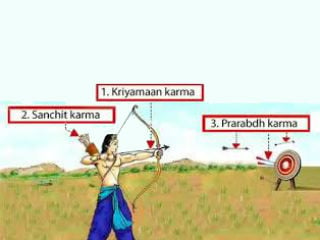In life, karma (An act, action which gives rise to destiny) is unavoidable. A continuous generation of ‘give-and-take’ accounts with others is a consequence that comes along with karma. Every karma compulsorily results in merits-demerits.
Only when there is no karmaphal (Fruit of karma) can a man be free from bondage. Not having an attachment, pride and expectation of the result of karma, performing every karma with an attitude that, ‘Every karma is the worship of God’, surrendering every karma unto the Holy feet of God upon its completion, etc., brings about non-doership in the karma.
Performing that karma which will result in spiritual growth and, ultimately, God-realisation, denotes Karmayoga. Even if the karma were to be worldly, performing it in a way such that no new sanskar (Subconscious impression) is created on the chitta (Subconscious mind) and thereby getting freed from the bondage of sanskars forever is the objective of Karmayoga. Karmayoga also teaches that even after God-realisation, instead of renouncing karma, the activity of drawing society towards sadhana (Spiritual practice) has to continue.
Performing karma as expected by the Hindu Dharma and the scriptures, by sacrificing the attachment and the expectations of the fruit, is a supreme definition of Karmayoga. Performing karma prescribed by the scriptures with a sense of duty is Karmayoga. It culminates in the purification of the chitta and subsequently in the attainment of Moksha (Final Liberation).
1. How to perform karma without getting entrapped in it?
- Refrain from sakam (With expectations) karma : Refrain from karmas performed with the desire to acquire worldly happiness; for desires and sanskars (Subconscious impressions) originate from them.
- Never leave any karma incomplete.
- Every karma should conclude with happiness at least at the psychological level.
- Instead of performing karmas we like and attain happiness, true happiness lies in doing whatever we do with interest and doing things as advised by the scriptures or Saints.
- With the fear of sinning while performing karma, never give up karma.
- Maintain equanimity about the success-failure of karma.
- Do not have expectations about the fruit of karma.
- To be able to reach a stage of being karmatit (Beyond the fruit of karma), allow things to happen as destined : ‘Become a dried leaf caught in a storm. Go wherever the storm takes you. No destinations, no rest, no shore, just keep drifting. Perform this experiment. Let things happen on their own. Let there be neither reaction, nor even slightest of resistance. Once you begin to drift like a leaf, you will get a slight glimpse of the karmatit state. This itself is samarpan (Complete surrender). – From ‘Shrimadbhagwadgeeta, Adhyaya 3’ written by Gurudev Dr Kateswamiji.
2. Incessant performance of swadharma-karma
(Karma as per Dharma) and prescribed duties, devoid of all attachments
Karma which purifies the antahkaran (Inner sense organs consisting of the conscious mind, subconscious mind, intellect, and ego) is known as swadharma-karma.’ – From ‘Shrimadbhagwadgeeta, Chapter 3’ written by Gurudev Dr. Kateswamiji.
A. Strictly adhering to swadharma-karma is a necessity
One’s own duty, meaning the swadharma, though devoid of merit, is preferable to the duty of another, meaning the paradharma, well performed. Swadharma means duties as defined by the class system. During the Bharatiya battle, when Arjun was ready to abandon the battlefield, thus renouncing his Kshatriya-dharma (Warrior duties) & accepting sanyas-dharma (Renunciant duties) that is apt for a Brahman, Shrikrushna advised him about practicing swadharma.
B. Any karma except the one performed as swadharma becomes bondage
Karma implied by Karmayoga is not just any karma; it is karma as prescribed by the Vedas, meaning abiding by our Dharma.
C. Since people like to emulate, therefore performing swadharma karma is important
Shrikrushna says, ‘O Arjun, I have no duties whatsoever in all the three worlds. I have nothing left to achieve, nor is there anything that I have not achieved, Yet, I remain ever engrossed in karma’. – Shrimadbhagwadgeeta, 3.22
D. It is essential to perform karma as prescribed in the scriptures for uniting people
Just as the ignorant perform karma more out of attachment to karma, so should the knowledgeable, who do not have attachment, perform karma to unite people. A spiritually evolved individual should not educate the ignorant people who are attached to performing karma prescribed by the scriptures. He should not ruin the faith in karma. On the contrary, he should himself perform meticulously all karmas prescribed by the scriptures and should get them performed by ignorant people.- Shrimadbhagwadgeeta, 3.26
E. Performing worldly karma as duties
Whatever happens in an individual’s life is as per his destiny; but instead of getting entrapped in Maya (The Great Illusion), we should perform the worldly tasks with a sense of duty.
F. Without performing swadharma-karma
that purifies the conscience, completeness is not possible
‘Karma has to be performed until the antahkaran gets purified. Should swadharma-karma not be performed, the antahkaran will not be purified. Without a pure antahkaran there is neither knowledge and self-realization nor God; & hence no completeness.’ – From ‘Shrimadbhagwadgeeta, Chapter 3’ written by Gurudev Dr. Kateswamiji.
3. Karma performed as a duty does not entrap in the bondage of karma
कार्यमित्येव यत्कर्म नियतं क्रियतेSर्जुन ।
संगं त्यक्त्वा फलं चैव स त्याग: सात्त्विको मत: ।।
– Shrimadbhagwadgeeta, 18.9
Meaning : When obligatory work is performed, O Arjun, only because it ought to be performed, leaving attachment and fruit, such relinquishment is regarded as sattvik (Sattva-predominant).
4. The characteristics of
samashti sadhana (Spiritual practice for
the spread of Spirituality) and the importance of
Gurukrupa (Grace of the Guru) in the performance of karma
A. Greater the association of the objective of karma to the samashti mission, greater is the demerit generated through the mistakes committed while performing that karma Therefore, any karma performed for the sake of samashti needs to be performed on the strength of Gurukrupa and with an attitude of surrender. Only then does that karma become akarma (Action that does not beget fruit) and the one performing it is freed from the accumulated demerits.
B. Therefore, it is said that karma should be performed only after giving it a deep thought, from the perspective of sadhana and with an egoless attitude. Only then can the individual remain detached from the resultant give-and-take account, accumulate merits and get liberated from the cycle of human birth.
C. Performance of karma should always be such that it destroys the six foes; only then it is considered as fulfilling karma. This itself is termed as ‘shuddha karma (Pure karma)’. God-realisation takes place through shuddha karma alone.
5. Once liberated from the bondage of karma, we attain God
शुभाशुभफलैरेवं मोक्ष्यसे कर्मबन्धनै: ।
संन्यासयोगयुक्तात्मा विमुक्तो मामुपैष्यसि ।।
– Shrimadbhagwadgeeta, 9.28
Meaning : Thus shall you be freed from the bondage of karmas, bearing good and evil results; with the heart steadfast in the Yoga of renunciation, and liberated you shall come unto Me.

 Using Kriyaman-karma effectively
Using Kriyaman-karma effectively Importance of Kriyaman-karma in overcoming Prarabdha-karma
Importance of Kriyaman-karma in overcoming Prarabdha-karma How to overcome sufferings of Prarabdha
How to overcome sufferings of Prarabdha Facing the consequences of Prarabdha
Facing the consequences of Prarabdha What is Sanchit-karma and Prarabdha?
What is Sanchit-karma and Prarabdha? Kartavya (Duty) karma
Kartavya (Duty) karma
Will complementing Karmayog with Gurukrupayog Sadhana help in spiritual progress ? Can Gurukrupayog Sadhana be done effectively without any obstacle along with Karmayog Sadhana?
Namaste Dibyam ji
Thank you for contacting us. You have asked a nice practical question. Gurukrupayog is a confluence of Karma, Bhakti and Jnanyog. Sachchidanand Parabrahman Dr Athavale is a living example of योगः कर्मसु कौशलम. Gurukrupayog teaches us how every action can be performed without expectations. Also, to complement every action with points of bhaktiyog such as chanting and surrender, so that the doership ego does not arise.
Again, no matter what path one follows, ultimately the grace of the Guru is required to merge with God. So implementing the eight fold path will only complement your spiritual practice and help you progress quickly.
We invite you to participate in our free online satsangs to learn more – https://events.sanatan.org/
Warm regards,
Sanatan Sanstha